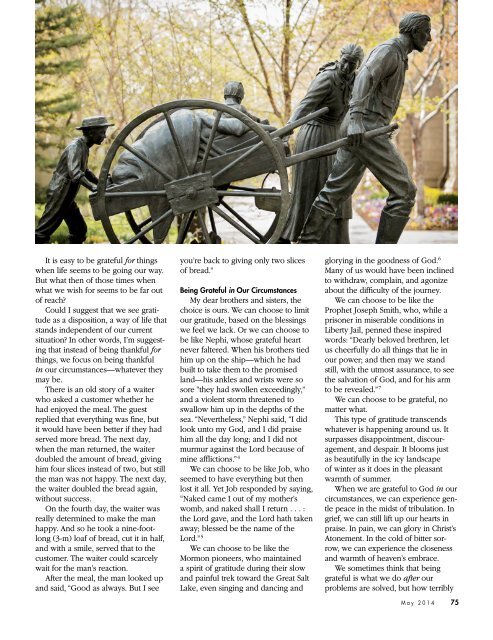2014-05-00-ensign-eng
2014-05-00-ensign-eng
2014-05-00-ensign-eng
- No tags were found...
Create successful ePaper yourself
Turn your PDF publications into a flip-book with our unique Google optimized e-Paper software.
It is easy to be grateful for thingswhen life seems to be going our way.But what then of those times whenwhat we wish for seems to be far outof reach?Could I suggest that we see gratitudeas a disposition, a way of life thatstands independent of our currentsituation? In other words, I’m suggestingthat instead of being thankful forthings, we focus on being thankfulin our circumstances—whatever theymay be.There is an old story of a waiterwho asked a customer whether hehad enjoyed the meal. The guestreplied that everything was fine, butit would have been better if they hadserved more bread. The next day,when the man returned, the waiterdoubled the amount of bread, givinghim four slices instead of two, but stillthe man was not happy. The next day,the waiter doubled the bread again,without success.On the fourth day, the waiter wasreally determined to make the manhappy. And so he took a nine-footlong(3-m) loaf of bread, cut it in half,and with a smile, served that to thecustomer. The waiter could scarcelywait for the man’s reaction.After the meal, the man looked upand said, “Good as always. But I seeyou’re back to giving only two slicesof bread.”Being Grateful in Our CircumstancesMy dear brothers and sisters, thechoice is ours. We can choose to limitour gratitude, based on the blessingswe feel we lack. Or we can choose tobe like Nephi, whose grateful heartnever faltered. When his brothers tiedhim up on the ship—which he hadbuilt to take them to the promisedland—his ankles and wrists were sosore “they had swollen exceedingly,”and a violent storm threatened toswallow him up in the depths of thesea. “Nevertheless,” Nephi said, “I didlook unto my God, and I did praisehim all the day long; and I did notmurmur against the Lord because ofmine afflictions.” 4We can choose to be like Job, whoseemed to have everything but thenlost it all. Yet Job responded by saying,“Naked came I out of my mother’swomb, and naked shall I return . . . :the Lord gave, and the Lord hath takenaway; blessed be the name of theLord.” 5We can choose to be like theMormon pioneers, who maintaineda spirit of gratitude during their slowand painful trek toward the Great SaltLake, even singing and dancing andglorying in the goodness of God. 6Many of us would have been inclinedto withdraw, complain, and agonizeabout the difficulty of the journey.We can choose to be like theProphet Joseph Smith, who, while aprisoner in miserable conditions inLiberty Jail, penned these inspiredwords: “Dearly beloved brethren, letus cheerfully do all things that lie inour power; and then may we standstill, with the utmost assurance, to seethe salvation of God, and for his armto be revealed.” 7We can choose to be grateful, nomatter what.This type of gratitude transcendswhatever is happening around us. Itsurpasses disappointment, discouragement,and despair. It blooms justas beautifully in the icy landscapeof winter as it does in the pleasantwarmth of summer.When we are grateful to God in ourcircumstances, we can experience gentlepeace in the midst of tribulation. Ingrief, we can still lift up our hearts inpraise. In pain, we can glory in Christ’sAtonement. In the cold of bitter sorrow,we can experience the closenessand warmth of heaven’s embrace.We sometimes think that beinggrateful is what we do after ourproblems are solved, but how terriblyMay <strong>2014</strong>75


